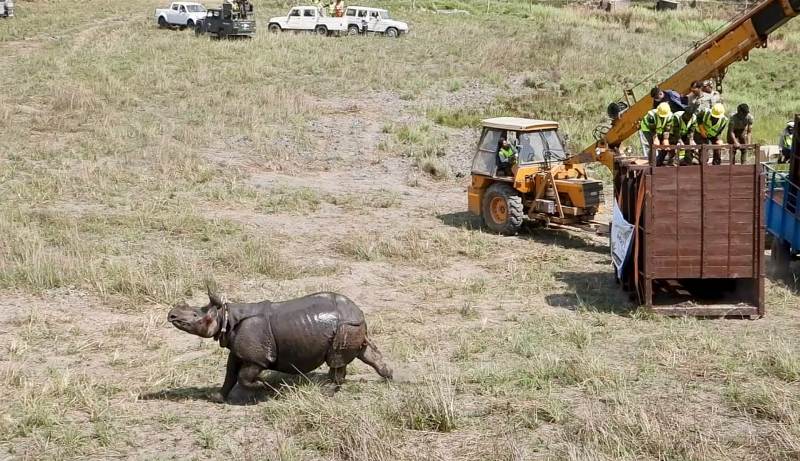Pallia: The Uttar Pradesh Forest Department has free-ranged another two greater one-horned rhinos into the Dudhwa Tiger Reserve.
The rhino translocation exercise aimed at introducing free-ranging rhinos and increasing their population in India’s Terai region was conducted on March 27 with support from government officials, field workers, vets, rhino experts, and mahouts.
The minutely planned and tediously conducted exercise involved translocating two rhinos from a crash of around 46 animals in containment for over four decades inside the 27-sq km fenced rehabilitation area at Dudhwa Tiger Reserve.
A male and a female rhino, aged between 15 to 20 years, were identified and tracked with the support of the camp elephants and their trained mahouts.
Specialised teams of experts then helped to tranquilise the rhinos and released them after checking their health parameters.
WWF-India, a technical partner of rhino conservation in Uttar Pradesh, has supported the Uttar Pradesh Forest Department in conducting the historic rhino translocation exercises at Dudhwa Tiger Reserve.
Anuradha Vemuri, PCCF (WL) & Chief Wildlife Warden, Uttar Pradesh Forest Department, said, “The successful relocation of rhinos at Dudhwa Tiger Reserve is a giant leap for rhino conservation. After decades of hard work, the efforts to bring back rhinos to India’s Terai landscape have finally begun to bear fruit”.
Sunil Chaudhury, PCCF & HoFF, Uttar Pradesh Forest Department added, “The translocation exercises will help re-establish the population of free-ranging rhinos, expand their habitat, and reduce the risk of inbreeding. The exercise exemplifies the commitment of the Uttar Pradesh Forest Department to conserve and protect the greater one-horned rhinos.”
Dr H. Rajamohan, Field Director of Dudhwa Tiger Reserve, said, “Bringing rhinos back to India’s Terai region has been our vision for decades. We have been working to conserve and secure the rhino habitat to reintroduce them in the wild. This exercise to free-range rhinos has set a precedent for similar rhino conservation efforts in India.”
Dr Dipankar Ghose, Senior Director of Biodiversity Conservation, WWF-India, said, “A stable population of free-ranging rhinos benefits the larger Terai landscape, which is one of the best production landscapes in the country. Rhinos also spread seeds through their dung which enriches their soil and helps plants flourish. They are indicators of grassland ecosystems.”
In a similar operation in November 2024, two rhinos were free-ranged by the Uttar Pradesh Forest Department at the Dudhwa Tiger Reserve.
ALSO READ: Meghalaya: Regional workshop held on export-oriented agriculture for NER farm families
The Forest Department, with support from WWF-India and other experts, have been monitoring their behaviour and health, and early findings have indicated their suitable adaptation to the area.
The learnings from the first translocation and the promising results have been the backbone of the second translocation exercise.















